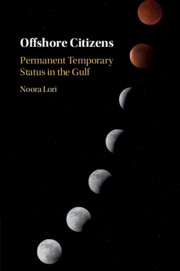Book contents
- Offshore Citizens
- Offshore Citizens
- Copyright page
- Contents
- Figures
- Tables
- Introduction
- 1 Limbo Statuses and Precarious Citizenship
- 2 Making the Nation: Citizens, “Guests,” and Ambiguous Legal Statuses
- 3 Demographic Growth, Migrant Policing, and Naturalization as a “National Security” Threat
- 4 Permanently Deportable: The Formal and Informal Institutions of the Kafāla System
- 5 “Taʿāl Bachir” (Come Tomorrow): The Politics of Waiting for Identity Papers
- 6 Identity Regularization and Passport Outsourcing: Turning Minorities into Foreigners
- 7 Conclusion
- Methodological Appendix
- References
- Index
1 - Limbo Statuses and Precarious Citizenship
Published online by Cambridge University Press: 05 August 2019
- Offshore Citizens
- Offshore Citizens
- Copyright page
- Contents
- Figures
- Tables
- Introduction
- 1 Limbo Statuses and Precarious Citizenship
- 2 Making the Nation: Citizens, “Guests,” and Ambiguous Legal Statuses
- 3 Demographic Growth, Migrant Policing, and Naturalization as a “National Security” Threat
- 4 Permanently Deportable: The Formal and Informal Institutions of the Kafāla System
- 5 “Taʿāl Bachir” (Come Tomorrow): The Politics of Waiting for Identity Papers
- 6 Identity Regularization and Passport Outsourcing: Turning Minorities into Foreigners
- 7 Conclusion
- Methodological Appendix
- References
- Index
Summary
The “offshore citizens” deal between the UAE and the Union of the Comoros is in many ways unique. The arrangement allows the UAE government to outsource national identity documents and formally create a permanently “temporary” class of noncitizens. The passport recipients are caught in a legal limbo between the official population categories of citizens and guests. But to what extent is this arrangement an example of a larger trend toward the adoption of legal statuses that suspend the question of national incorporation for certain groups? This chapter places the offshore citizens arrangement in comparative perspective by providing an overview of other categories of populations who are caught in a demographic boundary zone in between citizens and aliens.
I draw from recent studies on citizenship and migration in other regions to argue that the maturation of the nation-state system has – in addition to creating citizens and aliens – also systematically created demographic boundary zones of limbo populations. As states have monopolized the authority over legitimate interstate movement by building identity management infrastructures, they have also generated a proliferation of new visa categories and legal statuses that circumscribe and delimit access to citizenship. Since documentation is easier to resolve than larger questions of inclusion, the increasingly global drive toward identity reularization has (often inadvertently) produced a margin of people who lack access to permanent and secure citizenship rights. I use the concept of precarious citizenship to refer to people who are unable to gain access to secure citizenship rights and instead inhabit limbo statuses for protracted periods. Precarious citizenship is primarily experienced by two groups of people: (1) migrants who cannot accrue citizenship rights even after a protracted period of residency, and (2) internal “others” who are not recognized by the states in which they reside. People caught in this margin may hold ad hoc and temporary identity documents or they may lack any formal legal status; in either case they are unable to use documentation to “prove” their right to belong to a community and access citizenship rights in the long term. The type of identity documents individuals carry significantly impacts livelihood outcomes, because identity management infrastructures increasingly link travel documents to employment, education, housing, healthcare, and other public services.
- Type
- Chapter
- Information
- Offshore CitizensPermanent Temporary Status in the Gulf, pp. 29 - 49Publisher: Cambridge University PressPrint publication year: 2019



